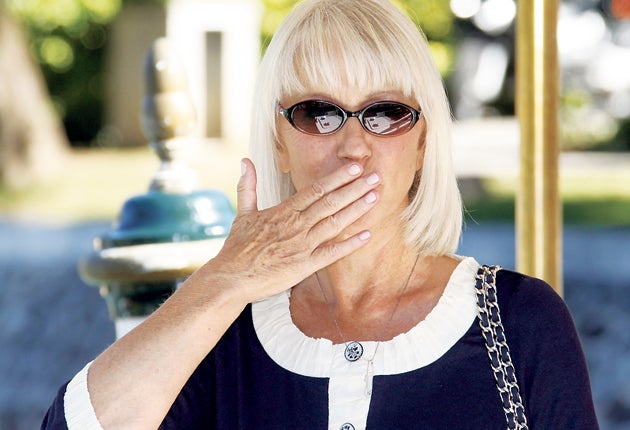Mirren ends Venice with a star-strewn 'Tempest'
Dame Helen turns Shakespeare's Prospero into Prospera – and brings 'the history of female struggle' to a glamorous stage

Your support helps us to tell the story
From reproductive rights to climate change to Big Tech, The Independent is on the ground when the story is developing. Whether it's investigating the financials of Elon Musk's pro-Trump PAC or producing our latest documentary, 'The A Word', which shines a light on the American women fighting for reproductive rights, we know how important it is to parse out the facts from the messaging.
At such a critical moment in US history, we need reporters on the ground. Your donation allows us to keep sending journalists to speak to both sides of the story.
The Independent is trusted by Americans across the entire political spectrum. And unlike many other quality news outlets, we choose not to lock Americans out of our reporting and analysis with paywalls. We believe quality journalism should be available to everyone, paid for by those who can afford it.
Your support makes all the difference.Britain's grand dame of stage and screen Helen Mirren brought the world's oldest film festival in Venice to an extravagant close last night when a new adaptation of Shakespeare's final play, The Tempest – in which she stars – received its world premiere.
Mirren takes the lead role of Prospera – a feminised version of Shakespeare's male Prospero, the exiled and castaway Duke of Milan who rules his island with sorcery.
The film also boasts Russell Brand, Alan Cumming and Alfred Molina among its stellar cast. But while The Tempest has been awarded the honour of closing the festival, the movieland jury is still out on the merits of its American director, Julie Taymor.
Although she has been acclaimed for her stage work, particularly the musical The Lion King, her previous films – including Frida, about the life of the artist Frida Kahlo, and Titus, an adaptation of another Shakespeare play, Titus Andronicus – have been noted for their visual rather than box-office appeal.
The Tempest was shot in Hawaii and despite the gender change – Mirren's character is the wife of the Milanese Duke – the dialogue required little alteration.
Mirren said in Venice last night: "Women have been punished for being powerful for many centuries and I thought that was the remarkable thing about making Prospero into Prospera. You can bring in that history of female struggle .... We can see now in the extreme fundamentalist states, whatever religion they are, that they want to exclude women from education ... because an educated woman in a dangerous thing."
Mirren earlier had warm words for the controversial comedian Brand, with whom she has been reunited on the set of Arthur, a remake of the 1981 film starring Dudley Moore. "Russell isn't a wild cannon," she said. "He has an incredible comedian's brain but he pays attention to detail."
It was hoped last night that The Tempest, while a non-competition film itself, might finally set alight a festival that has been judged competent but without a stand-out movie; unlike 2009, when the hard-hitting war story Lebanon was a popular winner of its prestigious Golden Lion award. Or 2008, when The Wrestler provided the surprise comeback of the Hollywood outsider Mickey Rourke.
This year's 24-strong competition line-up – featuring the youngest group of directors in memory – has been seen by critics as strong and varied, providing everything from French comedy to Polish existential minimalism and effects-heavy Chinese costume drama.

Watch Apple TV+ free for 7 days
New subscribers only. £8.99/mo. after free trial. Plan auto-renews until cancelled

Watch Apple TV+ free for 7 days
New subscribers only. £8.99/mo. after free trial. Plan auto-renews until cancelled
But it was the American director Sofia Coppola – the daughter of Francis Ford Coppola – who won the coveted award, for her film Somewhere.
Among the favourites to win had been the Chinese entry The Ditch, about political prisoners deported to labour camps in 1950s China, and the Russian film Silent Souls, a study of a fading minority culture and obsessive love. Post Mortem looks at Chile's military coup of 1973 through the eyes of a man working in a morgue, while the French comedy Potiche, starring Catherine Deneuve and Gérard Depardieu, was a feel-good success.
"The film average is very good," said the Italian newspaper Il Foglio, "but there's been nothing to fall in love with."
Join our commenting forum
Join thought-provoking conversations, follow other Independent readers and see their replies
Comments